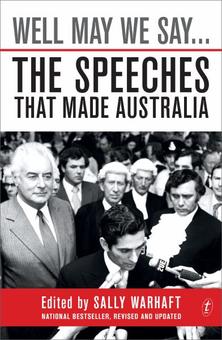The speeches that made Australia

I am a Queenslander who spent my teenage years chasing sun and surf at nearby beaches, but I remember a six-month sojourn spent in Sydney in the early 70s. Sydney’s beautiful beaches were forsaken as I spent my weekends at the Domain listening to soapbox speakers of the day. The main topics at this time were conscription and the war in Vietnam, and public speaking at this venue involved a lot of heckling from the crowd, but always provoked discussion of the issues from within my peer group. This book took me right back to those days, where I was enthralled by the power of a well composed speech. 
Who doesn’t remember the ‘It’s time’ speech by Gough Whitlam, or the ‘Well may we say’ speech following the dismissal of the Whitlam government? Or Malcolm Fraser’s ‘Life is not meant to be easy’, which was adopted as a slogan to express the struggles of working class Australia at that time?
Our relationships with Indigenous people of Australia have been shaped by speeches – from the initial recognition of Indigenous dispossession by Robert Lyon in 1833, including Paul Keating’s Redfern speech, through to John Howard’s expression of regret in 2000, and culminating in Kevin Rudd’s apology to the stolen generations in 2008.
Australia was at the forefront of the suffragette movement, with the Australian government granting the right to vote to women at the time of federation in 1901. Jessie Street, one of our earliest feminist activists, has a speech included in this work. The address was made to put forward the need for women for be paid equal pay for equal work, and to be allowed to continue in the workforce after the menfolk returned from the war.
Passionate debate on the topic of immigration policy has always been the subject of much discussion in a nation built on immigration. From Alfred Deakin’s declaration in 1901 that ‘the Commonwealth of Australia shall mean a white Australia’ through to John Howard’s ‘we will decide who comes to this country’ following the Tampa incident, demonstrate attempts to assert leadership on this issue.
It’s the case that political speeches are always well documented, and some become well known, even infamous. I was delighted to find within the pages of this book some treasures that would otherwise have gone unnoticed. One of these was an address by Philip Adams to teachers, regarding the exploitation of children which occurs through mass marketing. Mr Adams pointed out that ‘for every predator who tries to seduce children, there’s a major corporation successfully seducing millions’.
For sports fans there are speeches aplenty. An address by the coach John Kennedy at a 1975 AFL grand final makes interesting reading, as he delivers instructions to his team – as do the farewell speeches made by Sir Donald Bradman and Kangaroos footballer Jason McCartney.
I have left the best til last – a statement made by the twenty-five year old bushranger Ned Kelly at the time of his sentencing to execution in the Supreme Court in Melbourne. Australians have long been fascinated with the legend of Ned Kelly, who has been referred to as a folk hero. In his final statement, he chose to cast some doubt over the ability of his defence to properly cross examine the witnesses.
I recommend this book as an historical treasure trove of speeches that define us as a nation. It’s a rather large book of almost 600 pages, but easy to dip into and read a little at a time.
Available for $29.25 via Booktopia
What is your favourite speech of all time? Why? Tell us below








 Proudly Australian owned and operated
Proudly Australian owned and operated